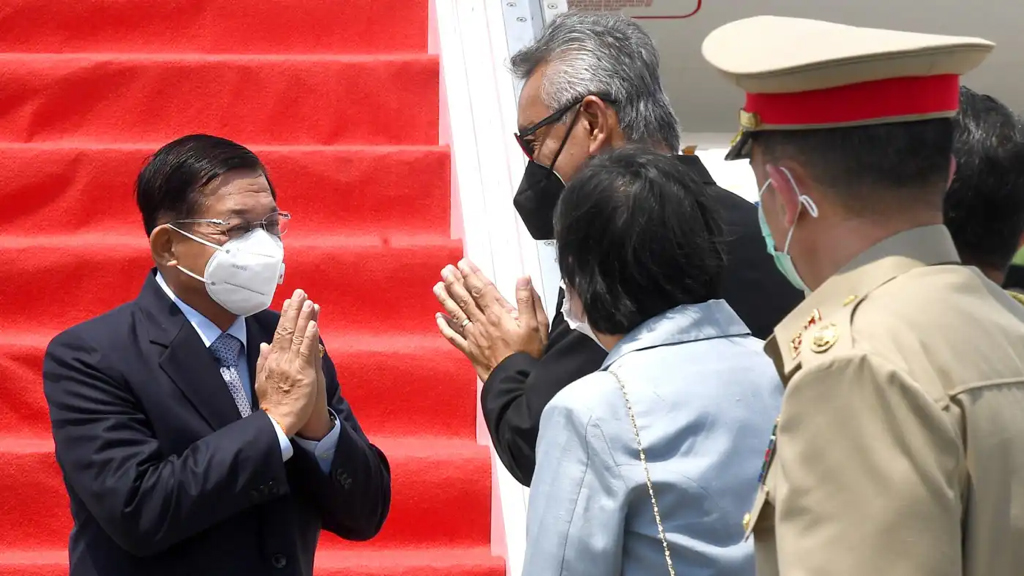ASEAN leaders urged Myanmar’s coup leader to de-escalate the violence in his country and seek a political resolution to the crisis through dialog at their summit in Jakarta, Indonesia on Saturday, but seemingly failed to elicit any firm promises from the military chief.
The assembled leaders pressured coup leader and armed forces commander-in-chief Senior General Min Aung Hlaing to end the violence by his security forces, which has seen at least 745 people killed during brutal crackdowns against peaceful anti-regime protesters, and called for the release of political prisoners including civilian leader Daw Aung San Suu Kyi. The junta has detained nearly 3,400 individuals since the Feb. 1 coup.
During the meeting, the leaders reached a five-point consensus to urge Myanmar to accept the appointment of a special envoy to engage with all the parties and to grant access to humanitarian assistance from ASEAN, which would be coordinated by the ASEAN secretary general in conjunction with the ASEAN Coordinating Center for Humanitarian Assistance (AHA Center).
Indonesian President Joko Widodo said the situation in Myanmar is “something that is unacceptable and must not continue,” adding that the violence must be stopped and democracy, stability and peace in Myanmar restored.
“The interests of the Myanmar people must always be the priority,” the Indonesian president said.
Widodo said, “I also conveyed the importance of the Myanmar military leadership to make a commitment to ending the use of force by the Myanmar military. At the same time all parties must exercise restraint so that tensions can be defused.”
Malaysia put forward a three-point proposal including a de-escalation of the situation on the ground and an end to killing and violence against civilians.

Malaysian Prime Minister Muhyiddin Yassin urged the coup leader to release all detainees promptly and unconditionally. “We realize that the success of ASEAN’s efforts on Myanmar very much depend on the willingness of the Tatmadaw to cooperate,” he said, referring to the Myanmar military.
After the meeting, Singapore Prime Minister Lee Hsien Loong told the media that the Myanmar junta leader said he is not opposed to a visit by a delegation from ASEAN to help resolve the crisis in the country.
“He said he heard us, he would take the points in which he considered helpful, that he was not opposed to ASEAN playing a constructive role, or an ASEAN delegation visit, or humanitarian assistance, and that they would move forward and engage with ASEAN in a constructive way,” Lee Hsien Loong said.
Press statements from the ASEAN leaders do not indicate that the coup leader made a specific promise to end the violence in his country or release political prisoners, however.
U Aung Myo Min, a longtime human rights advocate and the director of Equality Myanmar, welcomed ASEAN leaders’ efforts to stop the violence in Myanmar, but voiced disappointment that ASEAN failed to extract concrete promises from the coup leader on how he would meet their demands.
“We are disappointed because such demands and statements can be made even without face-to-face talks. Besides, we don’t see there is a set timeframe or an effective action plan, in order not to delay [implementation],” he said.
Expectations for ASEAN’s special summit on finding solutions to the deteriorating situation in Myanmar were not high, given the bloc’s policy of non-interference and its history of favoring previous military dictatorships in the country. Myanmar people were already disappointed that the bloc declined to invite representatives of the parallel, civilian National Unity Government (NUG) formed on April 16 by elected lawmakers from the ousted National League for Democracy.
U Moe Zaw Oo, the NUG’s deputy foreign minister, said, “The demand of ASEAN to end the violence should be linked with concrete action if the demand is not met. The same is true for the release of the political prisoners. ASEAN must have a concrete plan for what to do if these demands are not met,” U Moe Zaw Oo said.
“ASEAN should be aware of the fact that the military council is very accustomed to lying to its own people and the international community. We welcome the engagement but it should also be meaningful in the sense that it must have real impact on the situation on the ground. Otherwise, it would be a waste of time,” the deputy foreign minister said.
U Aung Myo Min rejected the first item in the “five-point consensus” spelled out in the chairman’s statement that was issued after the meeting, which states that “all parties shall exercise utmost restraint”. The human rights advocate said: “It shows that ASEAN does not understand the situation in Myanmar. In fact, our people, unarmed civilians, are not committing violence; we are being abused. Such wording is unfair, and [shows] they don’t know the true situation.”
You may also like these stories:
Regional Myanmar Protest Leader Appears in Court on Widely Derided Murder Charge
Myanmar Junta Forces Abduct and Torture Three More in Tamu
Myanmar Regime Troops Ordered to ‘Annihilate’ Protesters, Internal Memos Show

















